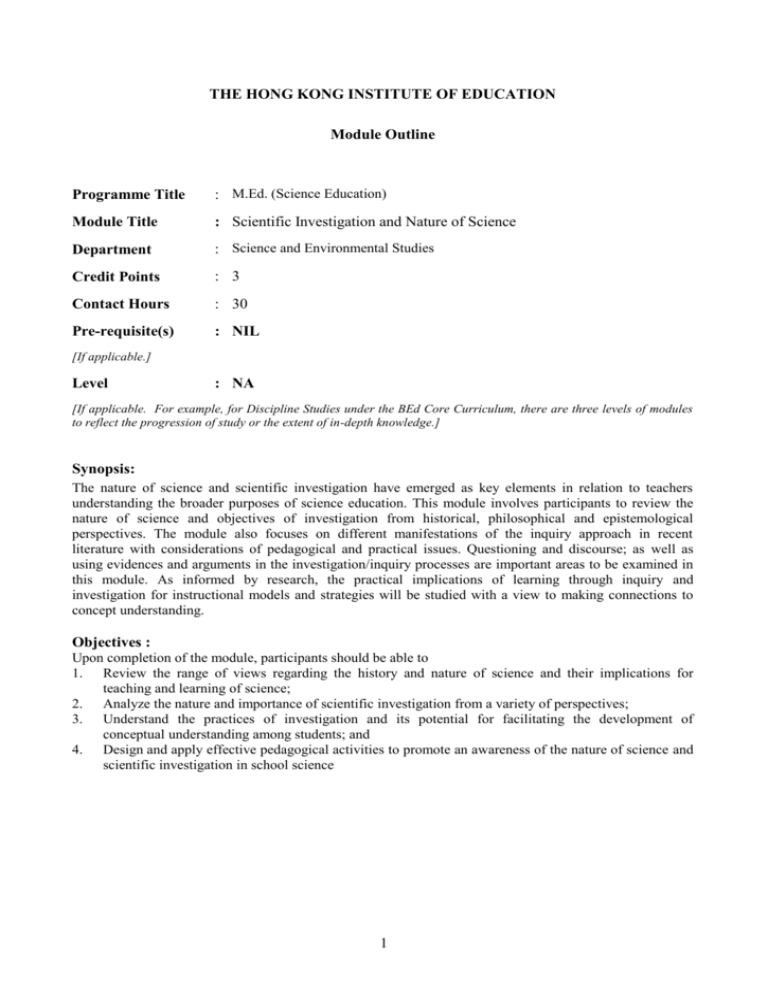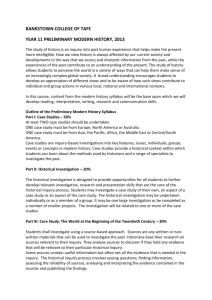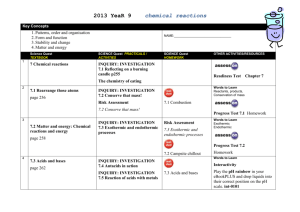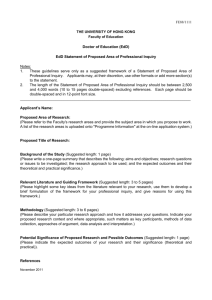SCG6001
advertisement

THE HONG KONG INSTITUTE OF EDUCATION Module Outline Programme Title : M.Ed. (Science Education) Module Title : Scientific Investigation and Nature of Science Department : Science and Environmental Studies Credit Points : 3 Contact Hours : 30 Pre-requisite(s) : NIL [If applicable.] Level : NA [If applicable. For example, for Discipline Studies under the BEd Core Curriculum, there are three levels of modules to reflect the progression of study or the extent of in-depth knowledge.] Synopsis: The nature of science and scientific investigation have emerged as key elements in relation to teachers understanding the broader purposes of science education. This module involves participants to review the nature of science and objectives of investigation from historical, philosophical and epistemological perspectives. The module also focuses on different manifestations of the inquiry approach in recent literature with considerations of pedagogical and practical issues. Questioning and discourse; as well as using evidences and arguments in the investigation/inquiry processes are important areas to be examined in this module. As informed by research, the practical implications of learning through inquiry and investigation for instructional models and strategies will be studied with a view to making connections to concept understanding. Objectives : Upon completion of the module, participants should be able to 1. Review the range of views regarding the history and nature of science and their implications for teaching and learning of science; 2. Analyze the nature and importance of scientific investigation from a variety of perspectives; 3. Understand the practices of investigation and its potential for facilitating the development of conceptual understanding among students; and 4. Design and apply effective pedagogical activities to promote an awareness of the nature of science and scientific investigation in school science 1 Content 1. History and the nature of science a. Perspectives on the nature of science and scientific investigation b. Selected case studies (e.g., The discovery of the structure of DNA, Continental drift theory, Mendel and genetics) on history and nature of science c. The important ideas from selected philosophers of science (e.g. K.R. Popper and Thomas Kuhn) d. Students’ and teachers’ views of the nature of science and their implications for teaching and learning science 2. Understanding the process of scientific investigation a. Cycle of investigation/inquiry b. Questioning and discourse in investigation/inquiry c. Understanding and using scientific evidence d. Constructing concept understanding from investigation/inquiry 3. Putting investigation/inquiry into practice a. Connecting investigation/inquiry to the curriculum b. Changes toward investigation/inquiry: teachers’ belief, teacher collaboration and student role Assessment A critical analysis of the scientific investigation practices occurring at a school and/or a classroom level in Hong Kong, the influences on those practices, and suggestions for improvement of the practices. (4000 word maximum) Required Text NIL 2 Recommended Reading 1. Abell, S. K. & Lederman N. G. (2007). Handbook of Research on Science Education. Mahwah, N.J. Lawrence Erbaum Associates. 2. Abd-El-Khalick, F., Boujaoude, S., Duschl, R., Lederman, N., Mamlok-Naaman, R., Hofstein, A., et al. (2004). Inquiry in Science Education: International Perspectives. Science Education, 88(3), 397-419. 3. Anderson, R. D. (2002). Reforming science teaching: what research says about inquiry. Journal of Science Teacher Education, 13(1), 1-12. 4. Chin, C., & Chia, L.G. (2004). Problem-based learning: Using students’ questions to drive knowledge construction. Science Education, 88(5), 707-727. 5. Gribbin, J. (2003). Science: A History. London: Penguin Books. 6. Flick, L. B. & Lederman, N. G. (2006). Scientific inquiry and nature of science: implications for teaching, learning, and teacher. Dordrecht : Springer. 7. Hammer, D., & Zee, E. V. (2006). Seeing the science in children’s thinking: case studies of student inquiry in physical science. Portsmouth, NH: Heinemann. 8. Hmelo-Silver, C. E., Duncan, R. G., & Chinn, C. A. (2007). Scaffolding and achievement in problembased and inquiry learning: a response to Kirschner, Sweller, and Clark (2006). Educational Psychologist, 42(2), 99-107. 9. Lederman, N.G. (2002). Scientific inquiry and nature of science as a meaningful context for learning in science. In S. P. Marshall, J. A. Scheppler, & M. J. Palmisano (Eds.), Science literacy for the twentyfirst century. Amherst, NY: Prometheus Books. 10. Lakkala, M., Lallimo, J., Hakkarainen, K. (2005). Teachers’ pedagogical designs for technologysupported collective inquiry: A national case study. Computers and Education.45, 337-356. 11. National Research Council (2000). Inquiry and the national science education standards. Washington, DC: National Academy Press. 12. Warren, D. (2001). The nature of science. London: Royal Society of Chemists. Related Websites East Asian Science Education Association http://theease.org/ National Association for Research in Science Teaching http://www.narst.org/ National Science Teacher Association http://www.nsta.org/ Related Journals Journal of Research in Science Education Journal of Research in Science Teaching Journal of Science Teacher Education 3







